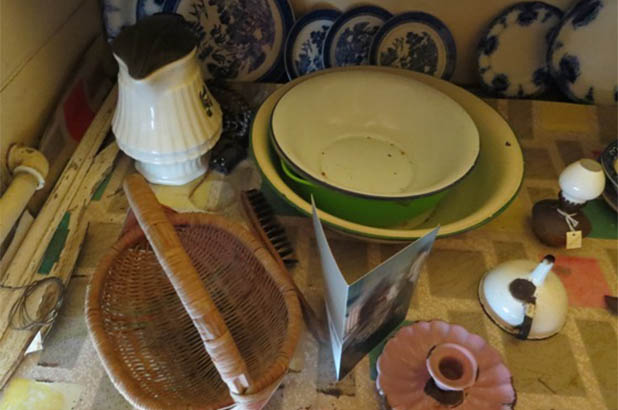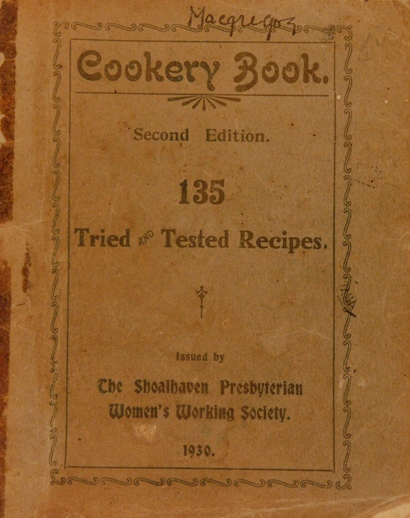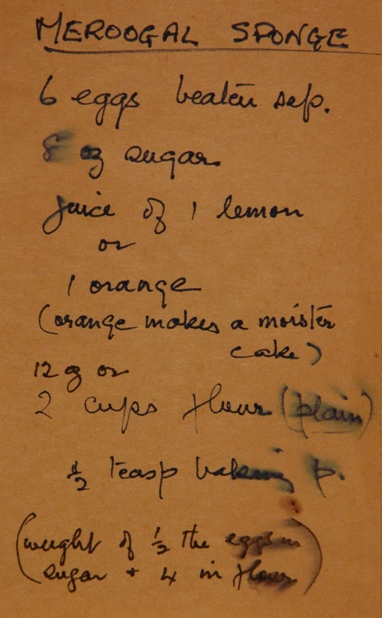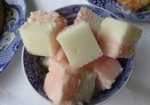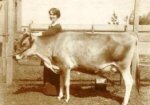Cooking was integral to the rhythm of day-to-day life at Meroogal, and we are fortunate to have original recipes from the family’s cookery books – most of them recorded by hand, transcribed into make-shift recipe books, but some were also published in the Shoalhaven Presbyterian Women’s Working Society cookery book, compiled in the 1930s. This diminutive cookery book demonstrates the strength of community that the Meroogal household was connected to. Meroogal was home to several generations of one family, but that family was representative of a broad intersection of the community. Thorburn and Macgregor, Wallace, Steel and Barnet families were all connected through family ties and community involvement. These family names crop up continually in the many stories and anecdotes that make Meroogal such a rich part of history in Nowra and the broader Shoalhaven district.
A very fragile copy of the book survives in the Meroogal collection, so fragile that we have recently photographed each page so that our research and interpretation can continue without further impact on it as an object. Its 135 recipes include several accredited to Meroogal ladies – Thorburn sisters Miss T[ottie] (Kennina Fanny Mackenzie) – Grandfather Pastry; K[ate] (Jessie Catherine) – Sandwich Cake; and B[elle] (Annabella Jane) – with a simple steamed pudding which takes on more significant meaning titled ‘Meroogal Pudding’. The book transcends generations with recipes from nieces E[lgin] – Sultana Cake, and H[elen] Macgregor, who contributed four recipes, and by the inscription seems to be the owner of this edition.
The personal touch
The book has been extensively annotated, presumably by Helen, judging by the handwriting, with personal tips and disclaimers, as the image below shows for Belle’s recipe:
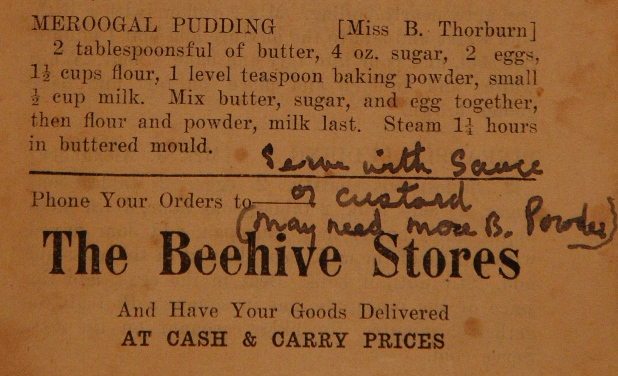
Tried and Tested – Meroogal Pudding recipe, The Shoalhaven Presbyterian Women’s Working Society Cookery Book, 1930. Photo Bethany Leyshan © HHT
The annotations, which range from simple asterics * to informed comments and detailed ‘edits’ indicate that Helen reviewed the ‘tried and tested’ recipes herself, from active use or intimate knowledge of the recipes themselves. Helen was an avid and experienced cook and she recorded other recipes in her own personal handwritten ledgers which are now part of the Meroogal collection.
A family secret?
Wedged between the pages is a manuscript recipe for Meroogal Sponge, which interestingly, was not printed in the book. We are told that the tea table was never complete without the Meroogal loaf sponge so as a ‘signature’ recipe, I scoured the book for it, to no avail. I looked for similarities in Kate’s Sandwich Cake, but the ingredients are intrinsically different, so it’s hard to know its provenance, or why it wasn’t featured in the book. Perhaps a family needs to keep some level of mystery on their tea table?
Tot and Kate would make the cake together, with Tottie beating the yolks and Kate the whites, with a knife on a large flat dinner plate. This is a lost art it seems, but one well known among traditional cooks, and worth trying yourself – you’ll realise how much patience is required – and energy – to hand-whip egg whites to a stiff peak without the help of electric beaters! You can watch June Wallace, the last family owner of Meroogal, make the sponge in the great aunts’ tradition.
Similarly, Aunt Kate’s shortbread, which must have been a family classic as it is written up several times across the collection in manuscript notes and ledgers, is recorded inside the back cover of the book. It is not in the published text, but it seems that Helen must have felt it belonged with this collection of recipes from across the community.
A guiding hand
We really get a sense of how much cooking and in particular, these recipes meant to Helen Macgregor from her annotations. My favourite is a tip to crush sugar to a finest grade by running it through the mangle! I get a strong sense that she reviewed her collection of recipes with a recipient in mind – they are insightful, practical and useful tips. But more-so, they are overwhelmingly personal and thoughtful directions, intended to guide someone through the processes involved in achieving the best possible result from recipes she herself cared about and valued. A different ink and obvious deterioration in handwriting quality indicates that the family recipes were reviewed and annotated again over an extended period, perhaps with an awareness that another generation of cooks was to inherit the family texts. A failure would be a reflection on personal tastes and a prized culinary heritage.
The relationship between families is explained further in the Meroogal guidebook.
